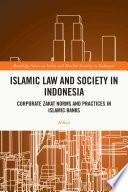This unparalleled Companion provides a comprehensive and authoritative guide to Islamic law to all with an interest in this increasingly relevant and developing field. The volume presents classical Islamic law through a historiographical introduction to and analysis of Western scholarship, while key debates about hot-button issues in modern-day circumstances are also addressed. In twenty-one chapters, distinguished authors offer an overview of their particular specialty, reflect on past and current thinking, and point to directions for future research. The Companion is divided into four parts. The first offers an introduction to the history of Islamic law as well as a discussion of how Western scholarship and historiography have evolved over time. The second part delves into the substance of Islamic law. Legal rules for the areas of legal status, family law, socio-economic justice, penal law, constitutional authority, and the law of war are all discussed in this section. Part three examines the adaptation of Islamic law in light of colonialism and the modern nation state as well as the subsequent re-Islamization of national legal systems. The final section presents contemporary debates on the role of Islamic law in areas such as finance, the diaspora, modern governance, and medical ethics, and the volume concludes by questioning the role of Sharia law as a legal authority in the modern context. By outlining the history of Islamic law through a linear study of research, this collection is unique in its examination of past and present scholarship and the lessons we can draw from this for the future. It introduces scholars and students to the challenges posed in the past, to the magnitude of milestones that were achieved in the reinterpretation and revision of established ideas, and ultimately to a thorough conceptual understanding of Islamic law.
By outlining the history of Islamic law through a linear study of research, this collection is unique in its examination of past and present scholarship and the lessons we can draw from this for the future.










